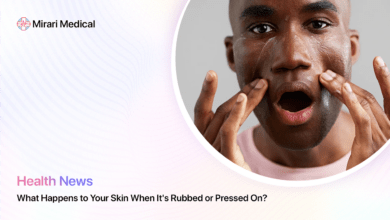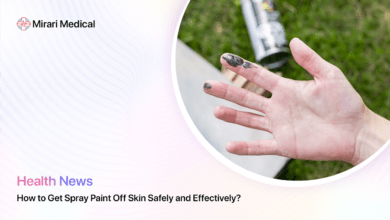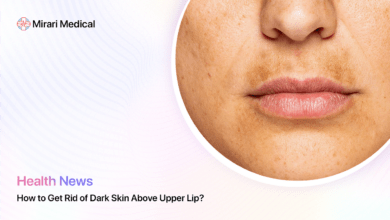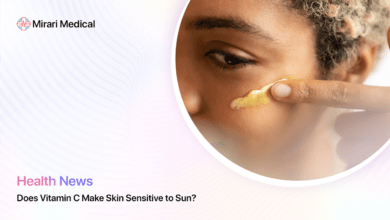How to Keep Your Skin Healthy in Summer?

You may be interested
While the phrase “whiter skin” is common, summer sun can be damaging to any complexion. This guide focuses on achieving healthy, radiant skin throughout the hot months, prioritizing sun protection and smart habits over unrealistic goals.
Sun Protection: The Foundation of Summer Skincare
The most crucial aspect of maintaining healthy skin during summer is protecting it from harmful UV rays. Dermatologists recommend using a broad-spectrum sunscreen with an SPF of 30 or higher every day, even on cloudy days. Broad-spectrum sunscreens provide protection against both UVA and UVB rays, which can cause sunburn, premature aging, and increase the risk of skin cancer.
When applying sunscreen, make sure to cover all exposed areas of skin, including the face, neck, ears, and hands. It’s also essential to reapply sunscreen throughout the day, especially after swimming or sweating. The American Academy of Dermatology recommends reapplying sunscreen every two hours or immediately after swimming or excessive sweating.
“Dermatologists recommend using a broad-spectrum sunscreen with SPF 30 or higher every day, even on cloudy days.”
In addition to using sunscreen, seeking shade during peak sun hours (typically between 10 am and 4 pm) can help minimize sun exposure and protect your skin. If you must be outdoors during these times, wear protective clothing and accessories, such as wide-brimmed hats, long-sleeved shirts, and sunglasses with UV protection.
Choosing the Right Sunscreen for Your Skin Type
When selecting a sunscreen, consider your skin type and any specific concerns you may have. For example, if you have oily or acne-prone skin, look for lightweight, oil-free formulas that won’t clog your pores. If you have dry or sensitive skin, opt for a moisturizing sunscreen that contains soothing ingredients like aloe vera or chamomile.
It’s also important to choose a sunscreen that you enjoy wearing, as this will make it more likely that you’ll use it consistently. Some people prefer chemical sunscreens, which absorb UV rays, while others prefer mineral sunscreens, which sit on top of the skin and reflect UV rays. Experiment with different formulas and textures until you find one that works well for your skin and lifestyle.
Sun Defense Beyond Sunscreen: Protective Clothing and Accessories
While sunscreen is essential, it’s not the only way to protect your skin from the sun. Wearing protective clothing and accessories can provide an extra layer of defense against UV rays, helping to keep your skin healthy and radiant throughout the summer.
Wide-Brimmed Hats and Sun-Protective Clothing
One of the most effective ways to shield your skin from the sun is by wearing a wide-brimmed hat. Look for hats made from tightly woven materials that provide ample coverage for your face, neck, and ears. Some hats even come with a UPF (Ultraviolet Protection Factor) rating, which indicates how much UV radiation the fabric blocks.
In addition to hats, consider investing in sun-protective clothing. Many brands now offer clothing items with built-in UPF, which can range from 15 (good) to 50+ (excellent). These garments are typically made from tightly woven, lightweight fabrics that cover a large portion of the skin, such as long-sleeved shirts, pants, and skirts.
Sunglasses: Protecting Your Eyes and Surrounding Skin
Don’t forget to protect your eyes and the delicate skin around them by wearing sunglasses with 100% UVA and UVB protection. Prolonged exposure to UV rays can lead to cataracts, macular degeneration, and other eye problems. When shopping for sunglasses, look for a label that confirms they block 100% of UV rays. Wraparound styles or oversized frames can provide additional protection for the skin around your eyes.
Seeking Shade During Peak Sun Hours (10 am – 4 pm)
Whenever possible, seek shade during the sun’s peak hours, typically between 10 am and 4 pm. This is when the sun’s rays are the strongest and can cause the most damage to your skin. If you must be outdoors during these times, try to find a shaded area, such as under a tree, umbrella, or covered porch.
Remember, UV rays can penetrate clouds and reflect off surfaces like water, sand, and concrete, so it’s important to practice sun safety even on cloudy or cool days.
Summer Hydration: Keeping Your Skin Plump and Glowing
Proper hydration is key to maintaining healthy, radiant skin during the summer months. When your skin is well-hydrated, it appears plumper, smoother, and more youthful. Conversely, dehydrated skin can look dull, dry, and more prone to wrinkles and fine lines.
The Importance of Drinking Plenty of Water
One of the most effective ways to keep your skin hydrated is by drinking plenty of water throughout the day. Aim to drink at least eight 8-ounce glasses of water per day, and more if you’re spending time outdoors or engaging in physical activity. Carrying a reusable water bottle with you can help you stay on track with your hydration goals.
In addition to plain water, you can also hydrate your body with other fluids like herbal tea, coconut water, and fresh fruit juices. However, be mindful of sugary drinks and alcohol, as these can actually contribute to dehydration.
Incorporating Water-Rich Fruits and Vegetables into Your Diet
Another way to support skin hydration is by incorporating water-rich fruits and vegetables into your diet. Some excellent options include:
- Watermelon
- Cucumbers
- Zucchini
- Tomatoes
- Strawberries
- Cantaloupe
- Peaches
These foods not only help hydrate your skin from the inside out but also provide essential vitamins, minerals, and antioxidants that support overall skin health.
Maintaining a Summer Skincare Routine: Cleansing, Exfoliating, and Moisturizing
In addition to sun protection and hydration, maintaining a consistent skincare routine is crucial for keeping your skin healthy and radiant throughout the summer. This involves cleansing, exfoliating, and moisturizing your skin regularly.
Cleansing to Remove Sweat, Dirt, and Sunscreen Buildup
During the summer months, your skin is exposed to sweat, dirt, and sunscreen, which can clog pores and lead to breakouts. To keep your skin clean and clear, it’s important to cleanse your face twice a day – once in the morning and once at night.
When selecting a cleanser, look for one that is tailored to your skin type. For example, if you have oily skin, opt for a gel or foaming cleanser that can help control excess oil. If you have dry or sensitive skin, choose a creamy or oil-based cleanser that won’t strip your skin of its natural moisture.
Gentle Exfoliation (1-2 Times per Week)
Exfoliating your skin once or twice a week can help remove dead skin cells, unclog pores, and promote a brighter, more even complexion. However, it’s important not to overdo it, as excessive exfoliation can irritate your skin and compromise its natural barrier.
When exfoliating, use a gentle scrub or chemical exfoliant (such as alpha-hydroxy acids or beta-hydroxy acids) that is suitable for your skin type. Be sure to follow up with a moisturizer to keep your skin hydrated and balanced.
Lightweight, Oil-Free Moisturizer
During the summer, it’s best to switch to a lightweight, oil-free moisturizer that won’t feel heavy or greasy on your skin. Look for formulas that contain hydrating ingredients like hyaluronic acid, glycerin, or aloe vera, which can help lock in moisture without clogging your pores.
If you have oily or acne-prone skin, consider using a gel-based moisturizer that absorbs quickly and helps control shine. For dry or sensitive skin, opt for a lotion or cream that provides more intensive hydration.
Remember to apply moisturizer both in the morning and at night, after cleansing and exfoliating your skin. This will help keep your skin soft, supple, and healthy-looking throughout the summer.
Healthy Habits for Radiant Summer Skin
In addition to a consistent skincare routine, adopting healthy lifestyle habits can go a long way in promoting radiant, healthy-looking skin during the summer months.
Balanced Diet Rich in Fruits, Vegetables, and Whole Grains
What you eat can have a significant impact on the health and appearance of your skin. A balanced diet that includes plenty of fruits, vegetables, and whole grains can provide your skin with the essential nutrients it needs to stay healthy and radiant.
Some skin-friendly foods to incorporate into your summer diet include:
- Berries: Rich in antioxidants that help protect your skin from free radical damage
- Leafy greens: Packed with vitamins A, C, and E, which support collagen production and skin health
- Fatty fish: Contains omega-3 fatty acids that help reduce inflammation and keep your skin moisturized
- Nuts and seeds: Provide healthy fats, vitamin E, and other nutrients that contribute to skin health
In addition to eating a balanced diet, it’s important to limit your intake of processed foods, sugary snacks, and excessive alcohol, as these can contribute to inflammation and premature aging.
Quality Sleep (7-8 Hours per Night)
Getting enough quality sleep is crucial for maintaining healthy, radiant skin. During sleep, your body repairs and regenerates skin cells, helping to keep your complexion looking fresh and youthful.
Aim to get 7-8 hours of sleep per night, and establish a consistent sleep routine to help regulate your body’s internal clock. This can involve going to bed and waking up at the same time each day, creating a relaxing bedtime ritual, and ensuring your sleep environment is cool, dark, and quiet.
Stress Management Techniques
Chronic stress can take a toll on your skin, leading to breakouts, dullness, and premature aging. When you’re stressed, your body releases cortisol, a hormone that can break down collagen and elastin, leading to fine lines and wrinkles.
To keep your skin looking its best during the summer months, it’s important to manage your stress levels. Some effective stress management techniques include:
- Regular exercise: Helps reduce stress and promote circulation, which can contribute to a healthy glow
- Meditation and deep breathing: Calms the mind and reduces stress hormones in the body
- Engaging in hobbies and activities you enjoy: Boosts your mood and helps you relax
- Connecting with loved ones: Provides emotional support and helps reduce stress levels
By incorporating stress management techniques into your daily routine, you can help keep your skin looking healthy and radiant throughout the summer.
“While achieving a specific ‘white’ skin tone might not be realistic, healthy habits contribute to a radiant summer glow.”
Understanding Skin Types: Tailoring Your Summer Skincare Routine
Everyone’s skin is unique, and understanding your skin type is key to developing an effective summer skincare routine. Here’s how to tailor your routine based on your specific skin type:
Oily Skin
If you have oily skin, you may notice that your skin becomes even shinier and more prone to breakouts during the summer months. To keep your skin balanced and clear, look for lightweight, oil-free products that won’t clog your pores.
Some tips for managing oily skin in the summer include:
- Using a gel or foaming cleanser that helps control excess oil
- Opting for a lightweight, water-based moisturizer that hydrates without adding greasiness
- Choosing oil-free, non-comedogenic sunscreens and makeup products
- Using blotting papers throughout the day to absorb excess shine
Dry Skin
If you have dry skin, the summer heat and humidity can actually help alleviate some of your dryness. However, it’s still important to keep your skin hydrated and protected from the sun.
Some tips for caring for dry skin in the summer include:
- Using a creamy, hydrating cleanser that won’t strip your skin of its natural oils
- Applying a rich, emollient moisturizer that helps lock in hydration
- Choosing a sunscreen with hydrating ingredients like hyaluronic acid or glycerin
- Using a humidifier in your bedroom to add moisture to the air
Sensitive Skin
If you have sensitive skin, the summer months can be particularly challenging. Heat, sweat, and sun exposure can all contribute to irritation and redness.
To keep your sensitive skin happy and healthy during the summer, try the following:
- Opt for fragrance-free, gentle cleansers and moisturizers that won’t irritate your skin
- Choose a mineral-based sunscreen with ingredients like zinc oxide or titanium dioxide, which are less likely to cause irritation
- Avoid harsh scrubs or exfoliants that can disrupt your skin’s natural barrier
- Use a cool compress or soothing aloe vera gel to calm any irritation or redness
By tailoring your summer skincare routine to your specific skin type, you can help keep your skin healthy, balanced, and radiant throughout the season.
Consulting a Dermatologist for Personalized Advice
While following a consistent skincare routine and practicing healthy habits can go a long way in promoting healthy, radiant skin, sometimes it’s necessary to seek the advice of a professional. If you have specific skin concerns or conditions, consulting a dermatologist can provide you with personalized recommendations and treatment options.
Addressing Specific Skin Concerns
A dermatologist can help you address a wide range of skin concerns, including:
- Acne: If you’re struggling with persistent breakouts or cystic acne, a dermatologist can recommend topical or oral medications to help clear your skin.
- Sun damage: If you have visible signs of sun damage, such as dark spots or fine lines, a dermatologist can suggest treatments like chemical peels or laser resurfacing to help improve the appearance of your skin.
- Hyperpigmentation: If you have uneven skin tone or dark patches on your skin, a dermatologist can recommend topical treatments or in-office procedures to help even out your complexion.
- Premature aging: If you’re concerned about the signs of premature aging, a dermatologist can suggest anti-aging treatments like retinoids or dermal fillers to help reduce the appearance of fine lines and wrinkles.
Tailored Recommendations Based on Your Skin Type and Needs
In addition to addressing specific skin concerns, a dermatologist can provide tailored recommendations based on your unique skin type and needs. They can help you develop a personalized skincare routine that takes into account factors like your age, lifestyle, and any underlying health conditions.
A dermatologist can also provide guidance on the best products to use for your skin type, including cleansers, moisturizers, and sunscreens. They can help you navigate the often-confusing world of skincare products and ensure that you’re using formulas that are safe and effective for your skin.
If you have any questions or concerns about your skin health, don’t hesitate to schedule an appointment with a dermatologist. They can provide you with the expert advice and personalized recommendations you need to keep your skin healthy and radiant throughout the summer and beyond.
FAQs
Do I need to wear sunscreen even on cloudy days?
Yes, it’s important to wear sunscreen every day, even on cloudy or overcast days. UV rays can penetrate through clouds and cause damage to your skin, so it’s essential to protect yourself rain or shine.
What are some healthy and effective ways to achieve a tan?
There is no truly healthy way to tan, as any change in your skin color is a sign of sun damage. However, if you do want to achieve a summer glow, consider using a self-tanner or bronzer instead of exposing your skin to UV rays. These products can give you a temporary, sun-kissed look without the risks associated with tanning.
How often should I be exfoliating my skin in the summer?
It’s generally recommended to exfoliate your skin 1-2 times per week, depending on your skin type and sensitivity. Over-exfoliating can actually damage your skin’s natural barrier and lead to irritation, so it’s important to be gentle and not overdo it.
My skin feels oily in the summer. What can I do?
If you have oily skin, the summer heat and humidity can exacerbate shine and breakouts. To keep your skin balanced, look for lightweight, oil-free products that won’t clog your pores. Use a gentle, foaming cleanser to remove excess oil, and opt for a water-based moisturizer that hydrates without adding greasiness. Blotting papers can also be helpful for absorbing shine throughout the day.
I don’t have health insurance. Are there affordable ways to care for my skin in the summer?
Yes, there are many affordable ways to care for your skin in the summer, even if you don’t have health insurance. Some tips include:
- Using a broad-spectrum sunscreen with an SPF of 30 or higher, which can be found at most drugstores or online retailers
- Seeking shade during peak sun hours and wearing protective clothing like hats and long-sleeved shirts
- Staying hydrated by drinking plenty of water and eating water-rich fruits and vegetables
- Incorporating skin-friendly foods like berries, leafy greens, fatty fish, nuts, and seeds can provide essential nutrients for skin health.
Staying Hydrated and Avoiding Dehydration
In addition to eating a balanced diet, staying hydrated is crucial for maintaining healthy skin during the summer. Dehydration can lead to dry, dull-looking skin and exacerbate the appearance of fine lines and wrinkles.
Some tips for staying hydrated include:
- Drinking plenty of water throughout the day, aiming for at least eight 8-ounce glasses
- Carrying a reusable water bottle with you to encourage regular hydration
- Avoiding excessive caffeine and alcohol consumption, which can contribute to dehydration
- Using a humidifier in your bedroom or office to add moisture to the air
By prioritizing hydration and a balanced diet, you can help keep your skin looking healthy and radiant from the inside out.
The Bottom Line: Consistency is Key
When it comes to maintaining healthy, radiant skin during the summer months, consistency is key. Developing a skincare routine that you can stick to every day is essential for achieving the best possible results.
This means:
- Applying sunscreen daily, even on cloudy or overcast days
- Cleansing your face twice a day to remove sweat, dirt, and sunscreen buildup
- Exfoliating 1-2 times per week to promote cell turnover and a brighter complexion
- Moisturizing morning and night to keep your skin hydrated and balanced
- Protecting your skin with hats, sunglasses, and sun-protective clothing when outdoors
- Staying hydrated by drinking plenty of water and eating water-rich fruits and vegetables
- Prioritizing a balanced diet, quality sleep, and stress management techniques
By making these habits a regular part of your summer routine, you can help keep your skin healthy, radiant, and protected throughout the season and beyond.
Key Takeaways
- Sun protection is the foundation of summer skincare, with SPF 30+ sunscreen being essential for protecting against UVA and UVB rays.
- Protective clothing and accessories, such as wide-brimmed hats and sunglasses, provide an extra layer of defense against sun damage.
- Staying hydrated and incorporating water-rich fruits and vegetables into your diet can help keep your skin plump and glowing.
- A consistent skincare routine that includes cleansing, exfoliating, and moisturizing is crucial for maintaining healthy skin during the summer months.
- Healthy habits like a balanced diet, quality sleep, and stress management techniques can contribute to a radiant summer complexion.
- Understanding your unique skin type and concerns can help you tailor your summer skincare routine for optimal results.
- Consulting a dermatologist can provide personalized advice and recommendations for addressing specific skin concerns.
Remember, while the pursuit of “whiter” or “lighter” skin is a common societal pressure, the true goal should be achieving healthy, radiant skin that reflects your natural beauty. By prioritizing sun protection, hydration, and a consistent skincare routine, you can help your skin look its best throughout the summer and beyond.
Your trusted source for health info, offering expert advice, news, and tips to stay healthy and informed.





